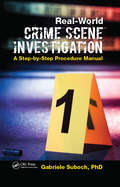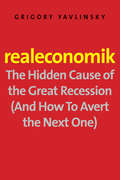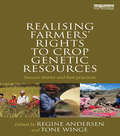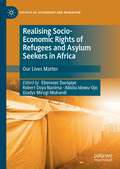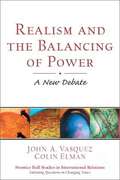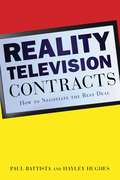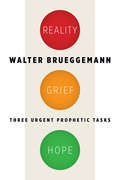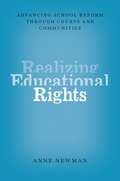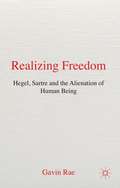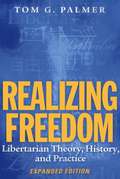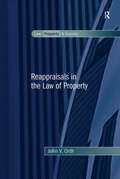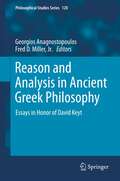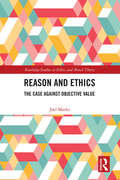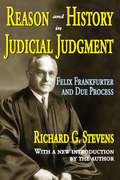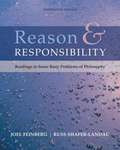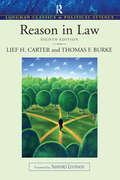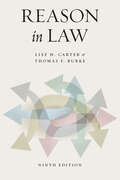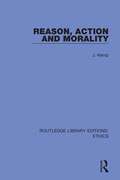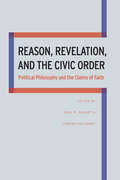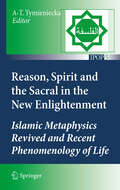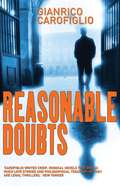- Table View
- List View
Real-World Crime Scene Investigation: A Step-by-Step Procedure Manual
by Gabriele SubochReal-World Crime Scene Investigation: A Step-by-Step Procedure Manual is designed as a field guide providing instruction on how to document a crime scene, including sketching, mapping, searching, collecting, and preserving physical evidence. It also addresses how to document a crime scene using photography and videography. It introduces modern fore
Realeconomik: The Hidden Cause of the Great Recession (and How to Avert the Next One)
by Grigory YavlinskyThis book directly confronts uncomfortable questions that many prefer to brush aside: if economists and other scholars, politicians, and business professionals understand the causes of economic crises, as they claim, then why do such damaging crises continue to occur? Can we trust business and intellectual elites who advocate the principles of Realpolitik and claim the "public good" as their priority, yet consistently favor maximization of profit over ethical issues? Former deputy prime minister of Russia Grigory Yavlinsky, an internationally respected free-market economist, makes a powerful case that the often-cited causes of global economic instability--institutional failings, wrong decisions by regulators, insufficient or incorrect information, and the like--are only secondary to a far more significant underlying cause: the failure to understand that universal social norms are essential to thriving businesses and social and economic progress. Yavlinsky explores the widespread disregard for moral values in business decisions and calls for restoration of principled behavior in politics and economic practices. The unwelcome alternative, he warns, will be a twenty-first-century global economy in the grip of unending crises.
Realising Farmers' Rights to Crop Genetic Resources: Success Stories and Best Practices
by Regine Andersen Tone WingeFarmers' Rights are essential for maintaining crop genetic diversity, which is the basis of all food and agricultural production in the world. The International Treaty on Plant Genetic Resources for Food and Agriculture recognizes Farmers' Rights and provides for relevant measures. However, implementation is slow, and in many countries there is resistance. This book shows the necessity of realizing Farmers' Rights for poverty alleviation and food security, the practical possibilities of doing so, and the potential gains for development and society at large. It provides decision-makers and practitioners with a conceptual framework for understanding Farmers’ Rights and success stories showing how each of the elements of Farmers' Rights can be realized in practice. The success stories have brought substantial achievements as regards one or more of the four elements of Farmers' Rights: the rights of farmers to save, use, exchange and sell farm-saved seed; the protection of traditional knowledge; benefit- sharing; and participation in decision-making. This does not mean that these examples are perfect. Challenges encountered on the way are conveyed and offer important lessons. The stories represent different regions and localities, including Europe, Asia, Africa and Latin America, as well as various categories of stakeholders and types of initiatives and policies.
Realising Good Growth: A Practical Guide for Business Leaders
by Simon Townsend Steve Kempster Stewart Barnes Jamie RuddRealising Good Growth is a practical and purposeful guidebook for leaders wishing to take a different path on a journey towards collective purpose and a better world, where profit is not the destination, just one of the sturdy pillars that supports the journey.Values to shape your journeyOur blueprint is drawn with values of sustainability, long-term vision, mutual enhancement and cooperation.Digital supportThe guidebook is supported by a range of integrated, tried-and-tested digital tools and accompanying website for practical use.What's in it for you and others?For businesses, the regenerative opportunity is about greater competitive advantage, retaining and attracting the best employees, enhanced innovation and productivity, and a greater return on all assets......But that fades into the shade in comparison to enhancing lives and enabling humanity to flourish.True success is measured not by profits alone, but by the lives we enrich and the future we create for all.Humanity has a big problem. Growth! More precisely the nature of growth and its consequences.We are passengers on a runaway train, hurtling toward a fractured and barren landscape. If we do not pull the emergency brake soon, we will leave our children stranded in a desolate wasteland, where the fertile fields of today are but a distant memory.But imagine a different outcome if this is resolved.Imagine a different path to follow, one less travelled, where businesses are a force for good.Imagine a regenerative economy led by businesses of all sizes pursuing an agenda of Good Growth – where employees have a deep sense of engagement and ownership in helping to grow businesses that deliver social value.Now, it is about experience, fulfilment and community – not one of self-centred endless consumption.
Realising Socio-Economic Rights of Refugees and Asylum Seekers in Africa: Our Lives Matter (Politics of Citizenship and Migration)
by Ebenezer Durojaye Gladys Mirugi-Mukundi Robert Doya Nanima Abiola Idowu-OjoThis book examines the socio-economic rights challenges of refugees and asylum seekers in Africa. It seeks to fill a major gap in the literature by providing a nuanced discussion of the barriers to the realisation of the socio-economic rights of refugees and asylum seekers in Africa. It equally aims to provide some concrete recommendations to African governments towards the realisation of the socio-economic rights of refugees and asylum seekers. With the aid of lessons from selected African countries, this book highlights the gaps, challenges and good practices regarding the realisation of the socio-economic rights of refugees and asylum seekers in the region. The book will be useful to researchers, students, academicians, policymakers, and international organisations or institutions interested in advancing the rights of refugees and asylum seekers.
Realism and the Balancing of Power: A New Debate
by John A. Vasquez Colin ElmanThis book explores all aspects of an important scholarly debate that has widespread implications for the political world, including the making of foreign policy--i.e., a debate over whether the contemporary theory of the balance of power as presented by Kenneth Waltz is a scientifically acceptable theory. It allows readers to examine and analyze the different views (in their original form) by all those in the debate and to come to their own conclusions. An Introduction gives an overview of the debate, defines and clarifies in simple language some of the major concepts used in philosophy of science, sets the historical context of the debate, and explains why it is important for both international relations theory and foreign policy making.
Reality Television Contracts: How to Negotiate the Best Deal
by Paul Battista Hayley HughesReality television is the growth area of television today. Individuals around the country want to be involved, whether in front of the camera or behind, and those who want to produce reality television seek to attract talent-maybe from the local beauty salon or perhaps the rodeo, extermination company, or trucking company-to begin taping their own "sizzle" reels to pitch to Hollywood production companies. At long last, here is a book that explains and educates those involved in reality television (and those who hope to be involved) regarding the terms found in these agreements and how best to negotiate them. This guide also includes: A brief history of reality television A breakdown of how ideas develop and of the "players" involved Reviews of and comments on agreement templates for all parties in the development and production stages "Deal point" checklists to help stay on trackDirected at attorneys who currently represent clients in the industry or would like to add reality television to their law practices, at reality television producers or those looking to break into the scene, and at all reality television participants, the contracts included in this book will be an indispensable resource all the way!Allworth Press, an imprint of Skyhorse Publishing, publishes a broad range of books on the visual and performing arts, with emphasis on the business of art. Our titles cover subjects such as graphic design, theater, branding, fine art, photography, interior design, writing, acting, film, how to start careers, business and legal forms, business practices, and more. While we don't aspire to publish a New York Times bestseller or a national bestseller, we are deeply committed to quality books that help creative professionals succeed and thrive. We often publish in areas overlooked by other publishers and welcome the author whose expertise can help our audience of readers.
Reality, Grief, Hope: Three Urgent Prophetic Tasks
by Walter BrueggemannWalter Brueggemann is one of the most highly regarded Old Testament scholars of our time; talk-show host Krista Tippett has even called him "a kind of theological rock star." In this new book Brueggemann incisively probes our society-in-crisis from the ground up.Pointing out striking correlations between the catastrophe of 9/11 and the destruction of ancient Jerusalem, Brueggemann shows how the prophetic biblical response to that crisis was truth-telling in the face of ideology, grief in the face of denial, and hope in the face of despair. He argues that the same prophetic responses are urgently required from us now if we are to escape the deathliness of denial and despair.Brueggemann’s Reality, Grief, Hope boldly confronts the dominant forces of our time, taking on principalities and powers that vie for our souls, and calls the church to courageous action.
Realizing Educational Rights: Advancing School Reform through Courts and Communities
by Anne NewmanIn Realizing Educational Rights, Anne Newman examines two educational rights questions that arise at the intersection of political theory, educational policy, and law: What is the place of a right to education in a participatory democracy, and how can we realize this right in the United States? Tracking these questions across both philosophical and pragmatic terrain, she addresses urgent moral and political questions, offering a rare, double-pronged look at educational justice in a democratic society. Newman argues that an adequate K–12 education is the right of all citizens, as a matter of equality, and emphasizes that this right must be shielded from the sway of partisan and majoritarian policy making far more than it currently is. She then examines how educational rights are realized in our current democratic structure, offering two case studies of leading types of rights-based activism: school finance litigation on the state level and the mobilization of citizens through community-based organizations. Bringing these case studies together with rich philosophical analysis, Realizing Educational Rights advances understanding of the relationships among moral and legal rights, education reform, and democratic politics.
Realizing Freedom: Hegel, Sartre, and the Alienation of Human Being
by Gavin RaeA first in English, this book engages with the ways in which Hegel and Sartre answer the difficult questions: What is it to be human? What place do we have in the world? How should we live? What can we be?
Realizing Freedom: Libertarian Theory, History, and Practice
by Tom G. PalmerWhat is freedom? How is freedom related to justice, law, property, peace, and prosperity? Tom Palmer has spent a lifetime as a scholar, teacher, journalist, and activist asking and answering these questions. Now as an expanded paperback, Realizing Freedom: Libertarian Theory, History, and Practice collects his best writings. Palmer s work ranges from the theory of justice to multiculturalism, democracy and limited government, and globalization, among many other topics. These essays have appeared in scholarly journals and in such newspapers as the New York Times, Wall Street Journal, and London Spectator. His work is accessible to scholars and thoughtful citizens alike. Palmer has smuggled photocopiers and fax machines into the Soviet Union; organized movements against the draft, taxes, censorship, and victimless crime laws; and ceaselessly promoted freedom in the most hostile locations, from communist Europe and China to Iraq to the halls of academe. Whether writing as a scholar, journalist, or activist, Palmer is never boring and always challenging.
Reappraisals in the Law of Property (Law, Property and Society)
by John V. OrthSome of the most basic doctrines of property law are very old, many dating to the medieval era. How can legal rules that were born so long ago remain viable today? In Reappraisals in the Law of Property, author John V. Orth considers various topics in order to discover the forces that have been made and are continuing to remake these areas of the law. Orth proposes three forces in particular that have shaped the development of property law over time: the inertial force of tradition, the reforming power of judicial and legislative activism, and the constant challenge of academic criticism. Together, these themes form the foundation of a critical and challenging work, one that re-evaluates property law and demonstrates both its enduring consistency and the unique and often drastic ways in which it has evolved in the modern era.
Reason and Analysis in Ancient Greek Philosophy
by Fred D. Miller Jr. Georgios AnagnostopoulosThis distinctive collection of original articles features contributions from many of the leading scholars of ancient Greek philosophy. They explore the concept of reason and the method of analysis and the central role they play in the philosophies of Socrates, Plato, and Aristotle. They engage with salient themes in metaphysics, epistemology, ethics, and political theory, as well as tracing links between each thinker's ideas on selected topics. The volume contains analyses of Plato's Socrates, focusing on his views of moral psychology, the obligation to obey the law, the foundations of politics, justice and retribution, and Socratic virtue. On Plato's Republic, the discussions cover the relationship between politics and philosophy, the primacy of reason over the soul's non-rational capacities, the analogy of the city and the soul, and our responsibility for choosing how we live our own lives. The anthology also probes Plato's analysis of logos (reason or language) which underlies his philosophy including the theory of forms. A quartet of reflections explores Aristotelian themes including the connections between knowledge and belief, the nature of essence and function, and his theories of virtue and grace. The volume concludes with an insightful intellectual memoir by David Keyt which charts the rise of analytic classical scholarship in the past century and along the way provides entertaining anecdotes involving major figures in modern academic philosophy. Blending academic authority with creative flair and demonstrating the continuing interest of ancient Greek philosophy, this book will be a valuable addition to the libraries of all those studying and researching the origins of Western philosophy.
Reason and Emotion in International Ethics
by Renée JefferyThe study of international ethics is marked by an overwhelming bias towards reasoned reflection at the expense of emotionally driven moral deliberation. For rationalist cosmopolitans in particular, reason alone provides the means by which we can arrive at the truly impartial moral judgments a cosmopolitan ethic demands. However, are the emotions as irrational, selfish and partial as most rationalist cosmopolitans would have us believe? By re-examining the central claims of the eighteenth-century moral sentiment theorists in light of cutting-edge discoveries in the fields of neuroscience and psychology, Renée Jeffery argues that the dominance of rationalism and marginalisation of emotions from theories of global ethics cannot be justified. In its place she develops a sentimentalist cosmopolitan ethic that does not simply provide a framework for identifying injustices and prescribing how we ought to respond to them, but which actually motivates action in response to international injustices such as global poverty.
Reason and Ethics: The Case Against Objective Value (Routledge Studies in Ethics and Moral Theory)
by Joel MarksReason and Ethics defends the theoretical claim that all values are subjective and the practical claim that human affairs can be conducted fruitfully in full awareness of this. Joel Marks goes beyond his previous work defending moral skepticism to question the existence of all objective values. This leads him to suggest a novel answer to the Companions in Guilt argument that the denial of morality would mean relinquishing rationality as well. Marks disarms the argument by conceding the irreality of both morality and logic, but is still able to rescue rationality while dispensing with morality on pragmatic grounds. He then offers a positive account of how life may be lived productively without recourse to attributions and assertions of right and wrong, good and bad, and even truth and falsity. Written in an accessible and engaging style, Reason and Ethics will be of interest to scholars and students working in metaethics as well as to the generally intellectually curious.
Reason and History in Judicial Judgment: Felix Frankfurter and Due Process
by Richard StevensStevens sees three crises in American judicial statesmanship. The first was the crisis of the founding. The well being of the country was subjected to grave danger, culminating in the crisis of the Civil War, and a refoundation was required. During the mid twentieth century, the United States faced the possibility of destruction, World War II and, the finding of malfeasance of the nation in the office of the president. The constant excitement of contest with antagonists makes it difficult to say whether the current crisis of the Supreme Court is merely a continuation or a whole new problem.The political leaders who resolved the first crisis and founded the Republic bequeathed as a part of that foundation the United States Supreme Court. During the subsequent history of the country, and with respect to its crises, the Court played a large part. Whether or not it does so well in the current period depends upon the quality of its judicial statesmanship. The judge is a person who acts. But it is considered action and considered action is based on prior understanding. The character of the Court's understanding, or direction, reveales itself in the course of its division over the application of the "due process" clause to state criminal proceedings.Frankfurter's view is problematic. If Western civilization is to be preserved, it must be because it is worth preserving. If it is worth preserving it must be because it is good. If so, can it be preserved by reliance upon and reference to itself, or must reliance not be placed upon that by virtue of which the thing to be preserved is worthy of preservation? This problem is not new to Western civilization. Much has been written about Frankfurter, and common descriptions of the terms "restraint" and "pragmatism" to characterize his doctrines. Previous treatments of these doctrines now available have not seemed adequate. The intention of "Reason and History in Judicial Judgment" is to treat them as ethical problems rather than as self-explaining conclusions.
Reason and Responsibility: Readings in Some Basic Problems of Philosophy
by Russ Shafer-Landau Joel FeinbergREASON AND RESPONSIBILITY: READINGS IN SOME BASIC PROBLEMS OF PHILOSOPHY has a well-earned reputation for excellence, with a proven selection of high-quality readings that cover centuries of thought and wisdom and include all major issues in metaphysics, epistemology, philosophy of religion, philosophy of mind, and ethics. The book's clear organization structures selections so that readings complement each other guiding you through contrasting positions on key concepts in philosophy. Clear, concise introductions to each Part provide just the right amount of guidance, letting you learn primarily from the readings themselves.
Reason in Law: Eighth Edition
by Tom Burke Lief CarterArguing that good legal reasoning remains the best device by which we can ensure that judicial impartiality, the rule of law, and social trust and peace are preserved, Thomas F. Burke and Lief H. Carter present an accessible and lively text that analyzes the politics of the judicial process. Looking at the larger social and institutional contexts that affect the rule of law - including religious beliefs and media coverage of the courts - Reason in Law uses cases ripped from the headlines to illustrate its theory in real-world practice.
Reason in Law: Ninth Edition
by Lief H. Carter Thomas F. BurkeOver the nearly four decades it has been in print, Reason in Law has established itself as the place to start for understanding legal reasoning, a critical component of the rule of law. This ninth edition brings the book's analyses and examples up to date, adding new cases while retaining old ones whose lessons remain potent. It examines several recent controversial Supreme Court decisions, including rulings on the constitutionality and proper interpretation of the Affordable Care Act and Justice Scalia's powerful dissent in Maryland v. King. Also new to this edition are cases on same-sex marriage, the Voting Rights Act, and the legalization of marijuana. A new appendix explains the historical evolution of legal reasoning and the rule of law in civic life. The result is an indispensable introduction to the workings of the law.
Reason, Action and Morality
by John KempOriginally published in 1964, this book critically examines some philosophical theories of the relation between reason and morality, with particular reference to the writings of Cudworth, Locke, Clarke, Hume and Kant. It also discusses the ways in which conduct may be assessed or criticised, and of the extent to which these ways of assessment may amount to, or be connected with, moral assessment. The conclusion shows how far and in what ways rational moral judgment is possible and what are its inevitable limitations.
Reason, Revelation, and the Civic Order: Political Philosophy and the Claims of Faith
by Carson HollowayWhile the dominant approaches to the current study of political philosophy are various, with some friendlier to religious belief than others, almost all place constraints on the philosophic and political role of revelation. Mainstream secular political theorists do not entirely disregard religion. But to the extent that they pay attention, their treatment of religious belief is seen more as a political or philosophic problem to be addressed rather than as a positive body of thought from which we might derive important insights about the nature of politics and the truth of the human condition. In a one-of-a-kind collection, DeHart and Holloway bring together leading scholars from various fields, including political science, philosophy, and theology, to challenge the prevailing orthodoxy and to demonstrate the role that religion can and does play in political life. Contributing authors include such important thinkers as Peter Augustine Lawler, Robert C. Koons, J. Budziszewski, Francis J. Beckwith, and James Stoner.
Reason, Spirit and the Sacral in the New Enlightenment
by Anna-Teresa TymienieckaRationality in its various expressions and innumerable applications sustains understanding and our sense of reality. It is traditionally differentiated according to its sources in the soul: in consciousness, in reason, in experience, and in elevation. Such a functional approach, however, leaves us searching for the common foundation harmonizing these rationalities. The perennial quest to resolve the aporias of rationality is finding in contemporary science's focus on origins, on the generative roots of reality, tantalizing hints as to how this may be accomplished. This project is enhanced by the wave of recent phenomenology/ontopoiesis of life, which reveals the workings of the logos at the root of beingness and all rationality, whereby we gaze upon the prospect of a New Enlightenment. In the rays of this vision the revival of the intuitions of classical Islamic metaphysics, particularly intuition of the continuity of beingness in the gradations of life, receive fresh confirmation.
Reasonable Doubt: A True Story of Lust and Murder in the American Heartland
by Steve VogelFollows a trial to its conclusion.
Reasonable Doubts
by Howard Curtis Gianrico CarofiglioA man gets sixteen years for smuggling drugs into Italy. Guerrieri takes on the appeal, discovers the accused was a neo-Fascist thug, and ends up in bed with his beautiful half-Japanese wife...the gnawing boredom of routine.
Reasonable Doubts: The O.J. Simpson Case and the Criminal Justice System
by Alan M. DershowitzAnalysis of the trial by a defense attorney.
